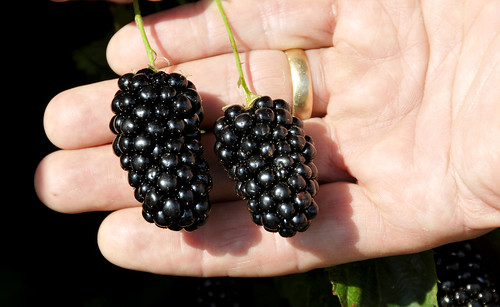How do you like your blackberries? Survey seeks consumer tastes
By Fred Miller
U of A System Division of Agriculture
March 31, 2017
Fast Facts:
- Online survey aims to guide fruit breeders’ efforts to give consumers what they want.
- Survey focuses on fresh blackberries, which are relatively new to fresh produce markets.
- Results will supplement consumer sensory tasting and quality analysis.
(498 words)
(Newsrooms: With additional art at https://flic.kr/s/aHskS1EG3B)
FAYETTEVILLE, Ark. — A survey conducted by the University of Arkansas System Division of Agriculture aims to give fruit breeders information they need to give consumers what they want in new blackberry varieties.
The online survey focuses on blackberries and is open to anyone who likes to eat them.
“We’ve already had 1,000 people complete the survey,” said Renee Threlfall, Division of Agriculture food scientist. “We need as large a sample of participants as possible.”
The survey is online: https://www.surveymonkey.com/r/TWH9SS2
“Among berry fruits, blackberries are relatively new to consumers as a commercial fresh-market product,” Threlfall said.
Consumers are more accustomed to purchasing blackberries seasonally, frozen or as part of other food products — jams and jellies, cobblers and the like, Threlfall said. “In recent years, fresh blackberries have had a more year-round presence in commercial fresh produce markets,” she said.
Despite growing markets for blackberries, there is little information about what consumers want from them, Threlfall said. “The division has one of the leading blackberry breeding programs in the world, and knowing what consumers want is useful information to our fruit breeders,” she said.
The Division of Agriculture’s blackberry breeding program was begun by James N. Moore in 1964. John R. Clark continued the fruit breeding program after Moore retired in the 1990s and Margaret Worthington joined the program in 2016.
Today, Clark said, Arkansas blackberry varieties are grown on every continent except Antarctica.
Threlfall wanted to know what consumers think about size, shape, sweetness and other blackberry traits. In 2013, she applied for and received the first of three consecutive grants from the Arkansas Agriculture Department’s Specialty Crop Block Grant Program.
The grants have allowed Threlfall and her collaborators in the division blackberry breeding program to collect data on consumer and descriptive sensory — taste, look, texture, sweeteness, acidity — and post-harvest attributes — how well the berries do in stroage. “If you want to have a commercial fresh-market blackberry, then the blackberry needs to be shipped and maintain good quality during storage,” Threlfall said.
The online survey Threlfall is conducting now focuses on consumer perceptions of blackberries. “Do consumers think blackberries are a healthy fruit?” she asked. “Do you like big berries or small ones? Does the shape of the berry make a difference to the consumer? How much does color or shininess matter? Do consumers care about the color changes that occur during storage?”
The survey data will complement years of Division of Agriculture research on the breeding, storage and health benefits of blackberries, Threlfall said. “The information that we are gaining from this research directly benefits the Division of Agriculture fruit breeding program,” she said. It gives breeders a target to shoot for when developing improved varieties for commercial fresh produce markets.
Results of the survey will be published and presented at regional and national horticultural meetings.
Threlfall said the survey will remain open for at least two more months. “I’d like to have thousands of blackberry consumers take this survey and help our blackberry industry grow,” she said.
Pursuant to 7 CFR § 15.3, the University of Arkansas System Division of Agriculture offers all its Extension and Research programs and services (including employment) without regard to race, color, sex, national origin, religion, age, disability, marital or veteran status, genetic information, sexual preference, pregnancy or any other legally protected status, and is an equal opportunity institution.
# # #
Media Contact: Mary Hightower
Dir. of Communication Services
U of A Division of Agriculture
Cooperative Extension Service
(501) 671-2126
mhightower@uada.edu
Related Links
